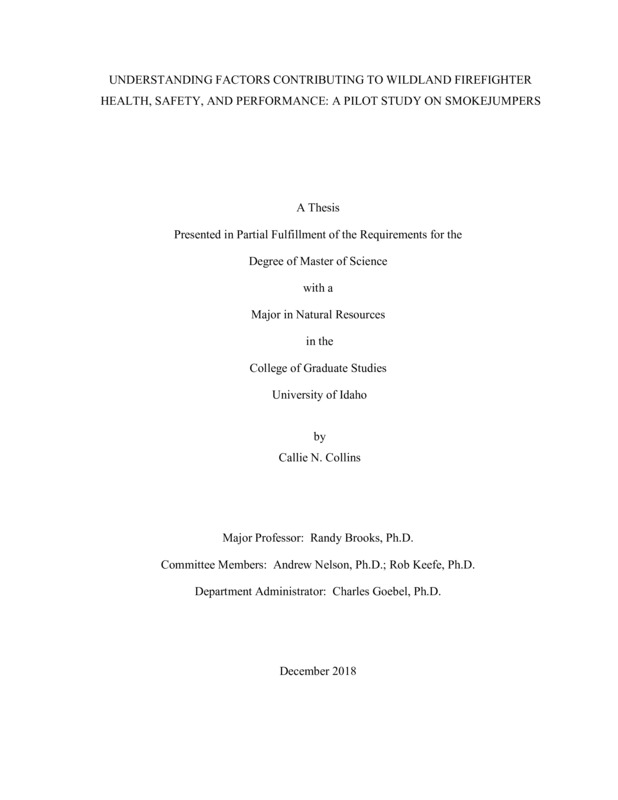Understanding Factors Contributing to Wildland Firefighter Health, Safety, and Performance: A Pilot Study on Smokejumpers
Collins, Callie Nicole. (2018-08). Understanding Factors Contributing to Wildland Firefighter Health, Safety, and Performance: A Pilot Study on Smokejumpers. Theses and Dissertations Collection, University of Idaho Library Digital Collections. https://www.lib.uidaho.edu/digital/etd/items/collins_idaho_0089n_11459.html
- Title:
- Understanding Factors Contributing to Wildland Firefighter Health, Safety, and Performance: A Pilot Study on Smokejumpers
- Author:
- Collins, Callie Nicole
- ORCID:
- https://orcid.org/0000-0003-2877-0608
- Date:
- 2018-08
- Program:
- Natural Resources
- Subject Category:
- Occupational safety
- Abstract:
-
Wildland firefighters have arduous and hazardous occupations and are being killed or injured at alarming rates with 1,114 killed while on assignment between 1994 and 2016. Thus, improving wildland firefighter health and safety is a National priority. Incident reports typically highlight situational awareness and communication as key factors leading to wildland firefighter injuries and death. However, important factors such as nutrition, hydration, and sleep on the fireline as well as overall fitness at other times of the year, have had limited research conducted. This research explores factors that may be leading to injuries and fatalities on the fireline. A survey was completed by 428 wildland firefighters to understand what they deem to be common contributing factors that lead to injuries and fatalities on the fireline with fatigue related to lack of sleep being one of the top self-reported factors contributing to accidents. After analysis of the survey, additional research was conducted on body composition and sleep quality and quantity to gain an understanding of what was happening physiologically on the fireline as well as gain insight on wildland firefighters sleep quality and quantity while on and off a fire assignment. This research was conducted the fire season of 2017 (June-September) with the ultimate goal of gaining a strong understanding of the self-reported factors surveyors identified in order to create future interventions that will increase wildland firefighter’s health, safety, and performance. Sleep quantity was significantly reduced on the fireline, yet sleep quality improved, like due to the firefighters being exhausted at the end of the work day. Body weights did not increase over the fire season, yet surprisingly, body fat increased significantly while lean muscle mass decreased significantly, leading researchers to believe that nutrition on the fireline played a role in these results.
- Description:
- masters, M.S., Natural Resources -- University of Idaho - College of Graduate Studies, 2018-08
- Major Professor:
- Brooks, Randall
- Committee:
- Nelson, Andrew; Keefe, Robert
- Defense Date:
- 2018-08
- Identifier:
- Collins_idaho_0089N_11459
- Type:
- Text
- Format Original:
- Format:
- application/pdf
- Rights:
- In Copyright - Educational Use Permitted. For more information, please contact University of Idaho Library Special Collections and Archives Department at libspec@uidaho.edu.
- Standardized Rights:
- http://rightsstatements.org/vocab/InC-EDU/1.0/

